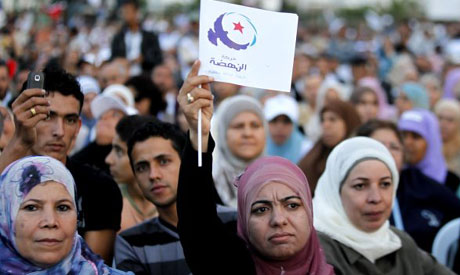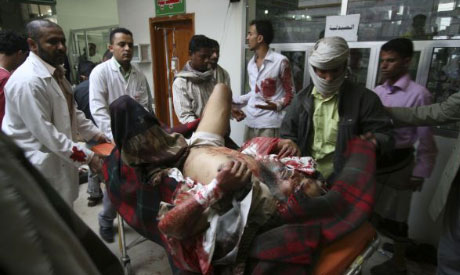Patients in Syrian state hospitals are subjected to torture and mistreatment as part of the government’s crackdown on dissent, while medics are also being targeted, Amnesty International said, as a leading Syrian rights activist
said that Damascus has detained more than 30,000 people since launching March.
“The Syrian government has turned hospitals into instruments of repression in its efforts to crush opposition,” London-based Amnesty said in a 39-page report released late on Monday.
The report documented how wounded patients in at least four government-run hospitals had been subjected to torture and other ill-treatment, both by medical workers and security personnel.
said that Damascus has detained more than 30,000 people since launching March.
“The Syrian government has turned hospitals into instruments of repression in its efforts to crush opposition,” London-based Amnesty said in a 39-page report released late on Monday.
The report documented how wounded patients in at least four government-run hospitals had been subjected to torture and other ill-treatment, both by medical workers and security personnel.
And “hospital workers suspected of treating protesters and others injured in unrest-related incidents have themselves faced arrest and torture,” it said, leaving them in a dilemma, according to AFP.
“It is deeply alarming that the Syrian authorities seem to have given the security forces a free rein in hospitals, and that in many cases hospital staff appear to have taken part in torture and ill treatment of the very people they are supposed to care for,” said Cilina Nasser, Amnesty International Middle East and North Africa researcher.
“Afraid of the consequences of going to a government hospital, many people have chosen to seek treatment either at private hospitals or at poorly equipped makeshift field hospitals,” the report said.
“Syrian medical workers are being placed in an impossible situation -- forced to choose between treating wounded people and preserving their own safety,” it said.
“It is deeply alarming that the Syrian authorities seem to have given the security forces a free rein in hospitals, and that in many cases hospital staff appear to have taken part in torture and ill treatment of the very people they are supposed to care for,” said Cilina Nasser, Amnesty International Middle East and North Africa researcher.
“Afraid of the consequences of going to a government hospital, many people have chosen to seek treatment either at private hospitals or at poorly equipped makeshift field hospitals,” the report said.
“Syrian medical workers are being placed in an impossible situation -- forced to choose between treating wounded people and preserving their own safety,” it said.
30,000 have been detained
The Syrian government has detained more than 30,000 people since launching a deadly crackdown on opposition protests in March, a leading Syrian rights activist said Monday, as Washington condemned the Syrian army’s incursions into Lebanon and said that dissidents of the Damascus regime had either been killed or taken prisoner at the border.
President Bashar al-Assad’s government has turned all the country’s main football stadiums into prisons, Radwan Ziadeh, co-founder of the Damascus Center for Human Rights and scholar at George Washington University in Washington, told a press conference at the U.N. headquarters, according to AFP.
Speaking at the launch of the Observatory for the Protection of Human Rights Defenders annual report, Ziadeh said nobody knew the exact figure for the number of detainees.
The United Nations says that more than 3,000 people have been killed.
Based on reports from activists working underground in Syria, Ziadeh said: “We have an estimate number that more than 30,000 have been detained.”
“My brother is in prison since August 30 and I have no information about him.” He added that he also had no news of an uncle and three cousins, one of them 14 years old, who had also been held.
“You can imagine, five relatives only from one family in one small city. This is why the number that has been detained -- 30,000 -- is an estimate number,” said Ziadeh, who has been condemned by Syrian media close to the country’s president.
“The Syrian regime actually cancelled the football championship because they turned over all the soccer fields to be detention centers and torture centers,” he said.
President Bashar al-Assad’s government has turned all the country’s main football stadiums into prisons, Radwan Ziadeh, co-founder of the Damascus Center for Human Rights and scholar at George Washington University in Washington, told a press conference at the U.N. headquarters, according to AFP.
Speaking at the launch of the Observatory for the Protection of Human Rights Defenders annual report, Ziadeh said nobody knew the exact figure for the number of detainees.
The United Nations says that more than 3,000 people have been killed.
Based on reports from activists working underground in Syria, Ziadeh said: “We have an estimate number that more than 30,000 have been detained.”
“My brother is in prison since August 30 and I have no information about him.” He added that he also had no news of an uncle and three cousins, one of them 14 years old, who had also been held.
“You can imagine, five relatives only from one family in one small city. This is why the number that has been detained -- 30,000 -- is an estimate number,” said Ziadeh, who has been condemned by Syrian media close to the country’s president.
“The Syrian regime actually cancelled the football championship because they turned over all the soccer fields to be detention centers and torture centers,” he said.
U.N. Security Council’s failure
The al-Fayhaa stadium in Damascus, the Assad stadium in Latakia, the main stadium in the city of city of Deraa were being used to hold thousands of prisoners, said Ziadeh.
Ziadeh said that the U.N. Security Council’s failure to pass a resolution on the Syria crisis had made opponents of Assad more desperate and more ready to use guns “to defend themselves against the security forces.”
Russia and China vetoed a proposed European resolution on Syria, saying there should be no threat of sanctions against Assad.
Western powers again criticized the veto at a council meeting on the Middle East on Monday.
France’s U.N. ambassador Gerard Araud said that tens of thousands of activists were being held in secret in Syria.
Araud said that those who vetoed the resolution or abstained must explain to the Syrian people and international opinion “what concrete action they propose to end this blood bath.”
“It is tragic that Assad’s barbaric acts have recently been met by silence from this council,” added U.S. ambassador Susan Rice.
Ziadeh said that the U.N. Security Council’s failure to pass a resolution on the Syria crisis had made opponents of Assad more desperate and more ready to use guns “to defend themselves against the security forces.”
Russia and China vetoed a proposed European resolution on Syria, saying there should be no threat of sanctions against Assad.
Western powers again criticized the veto at a council meeting on the Middle East on Monday.
France’s U.N. ambassador Gerard Araud said that tens of thousands of activists were being held in secret in Syria.
Araud said that those who vetoed the resolution or abstained must explain to the Syrian people and international opinion “what concrete action they propose to end this blood bath.”
“It is tragic that Assad’s barbaric acts have recently been met by silence from this council,” added U.S. ambassador Susan Rice.
Syrian army’s incursions into Lebanon
The United States, meanwhile, condemned the Syrian army’s incursions into neighboring Lebanon and suggested that dissidents of the Damascus regime had either been killed or taken prisoner at the border.
“Over the course of the last few weeks, it appears Syrian forces have entered Lebanese territory,” a State Department spokesman told reporters, denouncing the move and calling on Syria to respect Lebanon’s sovereignty, according to AFP.
“We are also deeply concerned by indications that Syrian dissidents may have been captured and possibly killed during operations near the border.”
Syria on Monday recalled its ambassador to Washington, according to an official television station, shortly after the United States said it had pulled out its envoy from Damascus for safety reasons.
The State Department said Ambassador Robert Ford, an open critic of President Assad’s crackdown on political dissent, had left Syria indefinitely after “credible threats” against his security.
Lebanese officials estimate that 5,000 Syrians, including deserting soldiers and opposition members, have sought refuge in Lebanon since the uprising against Assad erupted in March.
United Nations Secretary General Ban Ki-moon last week called on Syria to end incursions into Lebanon after Syrian troops shot three of its citizens dead near the border, warning that such raids could ignite tensions in the region.
Syria first sent it troops into Lebanon months after the outbreak of the country’s 1975-1990 civil war, and kept them deployed in its smaller neighbor for 29 years.
Assad withdrew forces from Beirut in the aftermath of the 2005 assassination of billionaire former premier Rafiq al-Hariri, whose killing was initially widely blamed on Syria.
The powerful Shiite militant group Hezbollah, an ally of Syria’s Bashar Assad, currently controls the majority of seats in Lebanon’s cabinet with its allies.
“Over the course of the last few weeks, it appears Syrian forces have entered Lebanese territory,” a State Department spokesman told reporters, denouncing the move and calling on Syria to respect Lebanon’s sovereignty, according to AFP.
“We are also deeply concerned by indications that Syrian dissidents may have been captured and possibly killed during operations near the border.”
Syria on Monday recalled its ambassador to Washington, according to an official television station, shortly after the United States said it had pulled out its envoy from Damascus for safety reasons.
The State Department said Ambassador Robert Ford, an open critic of President Assad’s crackdown on political dissent, had left Syria indefinitely after “credible threats” against his security.
Lebanese officials estimate that 5,000 Syrians, including deserting soldiers and opposition members, have sought refuge in Lebanon since the uprising against Assad erupted in March.
United Nations Secretary General Ban Ki-moon last week called on Syria to end incursions into Lebanon after Syrian troops shot three of its citizens dead near the border, warning that such raids could ignite tensions in the region.
Syria first sent it troops into Lebanon months after the outbreak of the country’s 1975-1990 civil war, and kept them deployed in its smaller neighbor for 29 years.
Assad withdrew forces from Beirut in the aftermath of the 2005 assassination of billionaire former premier Rafiq al-Hariri, whose killing was initially widely blamed on Syria.
The powerful Shiite militant group Hezbollah, an ally of Syria’s Bashar Assad, currently controls the majority of seats in Lebanon’s cabinet with its allies.



